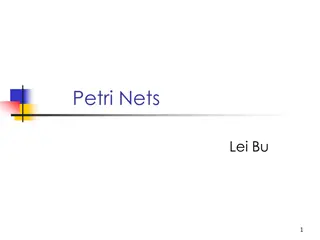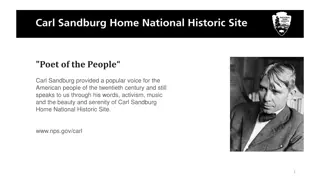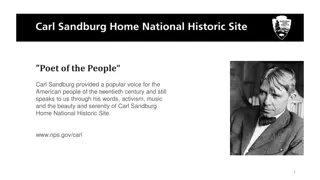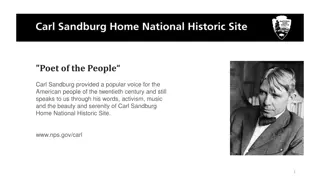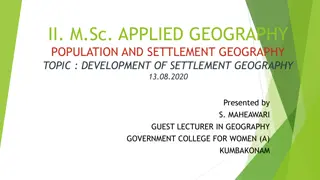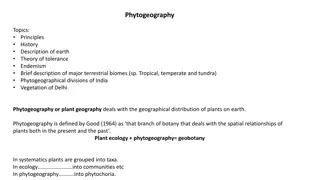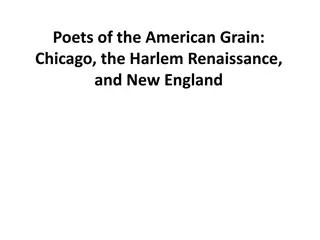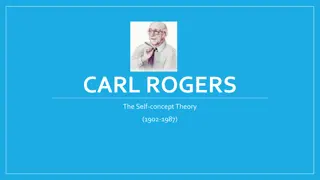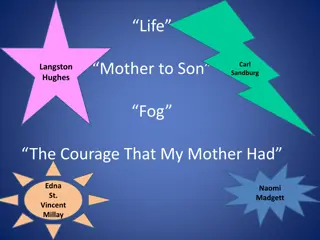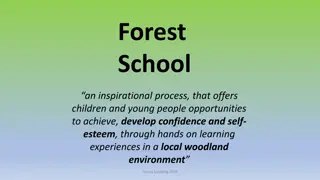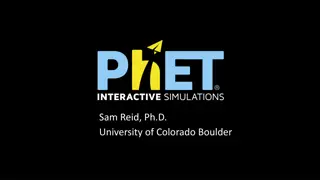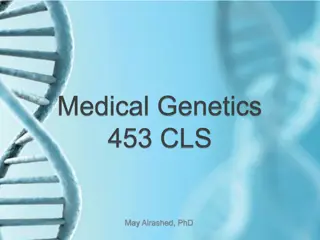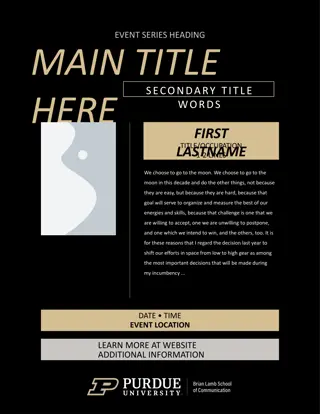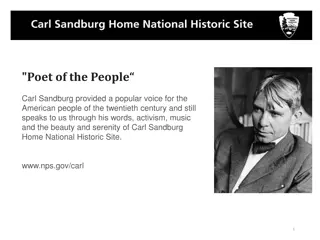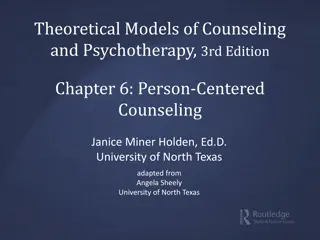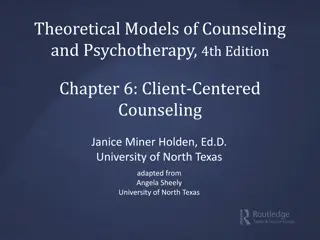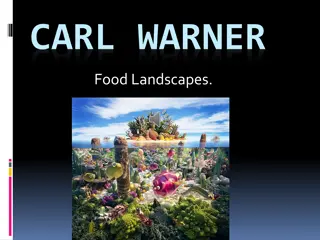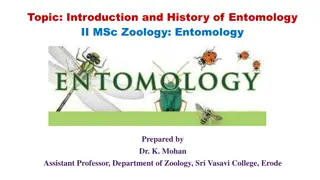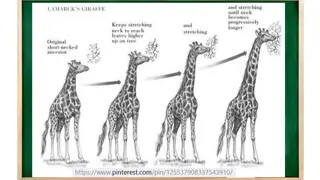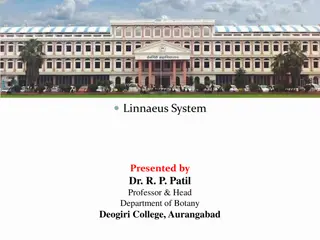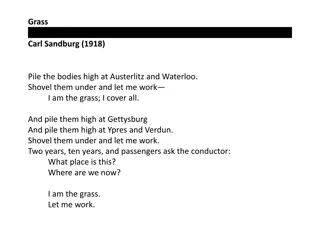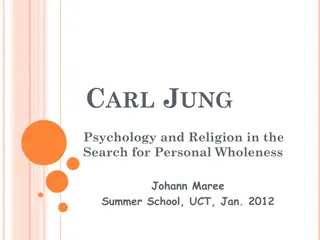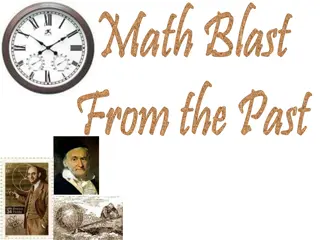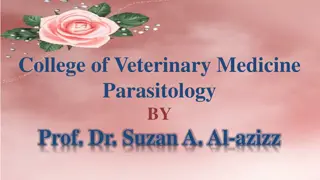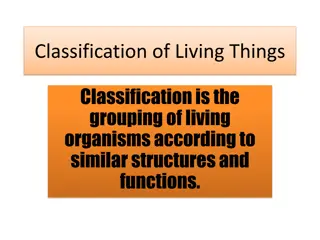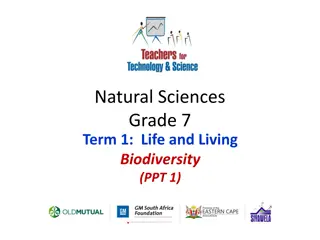Carl D. Perkins Career and Technical Education Act (Perkins V)
Purpose and benefits of the Perkins Act in developing academic, technical, and employability skills in students, promoting partnerships, providing research and technical assistance, and increasing employment opportunities for underrepresented populations.
2 views • 22 slides
Understanding Petri Nets: A Versatile Tool for Modeling Systems
Petri nets are a powerful modeling tool characterized by their asynchronous state transitions, making them ideal for representing concurrent and distributed systems. Originating from Carl Adam Petri's work in the 1960s, Petri nets have found diverse applications in fields such as computer science an
1 views • 84 slides
Evolution and Plant Systematics Lecture Overview
This lecture outline delves into the concepts of evolution, unity, and diversity of organisms on Earth, covering topics such as fossils, Lamarck and Darwin's theories, adaptation, natural selection, artificial selection, Carolus Linnaeus' systematics, plant evolution, and the demonstration of evolut
5 views • 26 slides
Overview of Heavy Chemicals Manufacturing Process
The field of industrial chemistry involves the large-scale preparation of heavy chemicals, which are chemicals produced and used commercially. This process requires an understanding of various physico-chemical principles and specific manufacturing techniques for chemicals like Ammonia, Sulphuric Aci
1 views • 30 slides
Likely New Members of the 117th Congress - Election 2020 Predictions
Predicting election outcomes is complex. Solid races are those where one candidate has a clear advantage due to various factors. Meet likely new members of the 117th Congress, including Jerry Carl in Alabama's 1st district, Barry Moore in Alabama's 2nd district, and Jay Obernolte in California's 8th
1 views • 25 slides
Person-Centered Thinking in Direct Care Services
Providing Person-Centered Care is essential, especially during challenging times like COVID-19. This training focuses on understanding residents' needs, using behavioral and nonverbal indicators to improve care quality, and embracing a strength-based approach. Learn about Person-Centered Thinking, C
0 views • 24 slides
Understanding Maslow's Hierarchy of Needs in Humanistic Psychology
Humanistic psychologists, such as Abraham Maslow and Carl Rogers, viewed personality as a quest for self-determination and self-realization. Maslow's hierarchy of needs illustrates how individuals progress from fulfilling basic physiological needs to achieving self-actualization and self-transcenden
0 views • 25 slides
Dive into Carl Sandburg's Poetry and Performance
Explore the essence of Carl Sandburg's poetry and the art of performance through engaging activities like watching videos, practicing poems, and channeling expression. Discover the beauty and significance of his words that resonate with the American people even today.
1 views • 7 slides
Mastering the Long Jump Technique with Dr. Rajeshwari
The long jump, a combination of speed, technique, and precision, is more than just the jump itself. Dr. Rajeshwari explains the key elements such as setting up the approach, drive and transition phases, as well as the attack phase and final steps to excel in this track and field event. Learn from th
0 views • 10 slides
Carl Sandburg: Poet of the People and Biographer of Lincoln
Explore the legacy of Carl Sandburg, the Poet of the People in the 20th century, through his words, activism, and music. Discover his tribute to Abraham Lincoln and his biographical works. Dive into Sandburg's captivating storytelling of Lincoln's childhood and upbringing, reflecting on how he shape
0 views • 7 slides
Influential Voices: Carl Sandburg, Bob Dylan, and Songs of Social Justice
Explore the impact of poets like Carl Sandburg and musicians like Bob Dylan on society through their words, activism, and music. Discover how their works have influenced and been influenced by historic events, reflecting the dreams and struggles of the American people. Dive into the powerful message
3 views • 7 slides
Exploring Archetypal Theory in Literature
Delve into the world of archetypal theory, rooted in the works of Sigmund Freud and Carl Jung. Uncover the significance of symbols and recurring figures in different cultures, as well as how traditional archetypes transcend genres and time periods. Understand the impact of archetypal characters, ima
0 views • 11 slides
Development of Settlement Geography: Contributions from Germany, France, and Others
Development of Settlement Geography has been influenced by major contributions from countries like Germany, France, and other European nations. German scholars like Carl Ritter and August Meitzen focused on house types and urban centers, while French geographers like Vidal de La Blache emphasized ru
0 views • 9 slides
Understanding Phytogeography: Geographical Distribution of Plants
Phytogeography, the branch of botany dealing with plant distribution, encompasses principles, history, major biomes, and India's divisions. It explores phytochoria, natural floristic areas based on species distribution. The study's history dates back to Theophrastus and Linnaeus, with Humboldt and H
0 views • 7 slides
American Poets of Chicago, Harlem Renaissance & New England
Explore the works of renowned American poets like Robert Frost, Carl Sandburg, Langston Hughes, and Gwendolyn Brooks. Delve into poems such as "The Gift Outright," "Fire and Ice," "The Negro Speaks of Rivers," and "A Bronzeville Mother Loiters in Mississippi." Discover the rich literary landscape of
0 views • 8 slides
Carl Rogers and the Self-Concept Theory
Carl Rogers, a prominent figure in personality theory, emphasized individuals' constructive potential and the impact of their subjective experiences on personality development. He viewed individuals as goal-directed and capable of change, with the environment playing a facilitating or inhibiting rol
1 views • 78 slides
Cork Pops Orchestra November 2023 Concerts for Schools Programme
The Cork Pops Orchestra will be presenting a diverse programme in November 2023 featuring a range of musical pieces including works by Richard Strauss, Carl Orff, G. F. Handel, Antonio Vivaldi, and Beethoven. Additionally, there will be pop songs, spirituals, and a music technology demo. Classroom r
0 views • 16 slides
Understanding Taxonomy and Scientific Classification
Explore the world of taxonomy and scientific classification, from the discipline of classifying organisms to assigning scientific names using binomial nomenclature. Learn the importance of italicizing scientific names, distinguish between species, and understand Linnaeus's system of classification.
0 views • 19 slides
Exploring Connemara Farms and Sandburg's Legacy
Dive into the world of Connemara Farms and the legacy of the Sandburg family. Visit the picturesque farm, learn about Carl Sandburg's writings, and uncover intriguing details about the family's life. From goats at Connemara to Carl Sandburg's literary works, this journey offers a unique blend of nat
0 views • 28 slides
Explore Poetry with Poets Langston Hughes, Edna St. Vincent Millay, Naomi Madgett, and Carl Sandburg
Delve into the world of poetry with renowned poets Langston Hughes, Edna St. Vincent Millay, Naomi Madgett, and Carl Sandburg. Discover the themes, structures, and figurative language in their works to enhance your appreciation for poetry.
1 views • 47 slides
Exploring Forest School: A Journey of Learning and Development
Forest School is an inspirational process that fosters holistic development through hands-on experiences in woodland settings. Originating in the UK, it follows six principles of good practice, emphasizing regular sessions, learner-centered approaches, and qualified practitioners. Joining a Forest S
0 views • 5 slides
Interactive Science Simulations by PhET - Engaging Learning Experiences
Explore PhET Interactive Simulations founded by Nobel Prize physicist Carl Wieman, offering over 120 interactive simulations across various scientific disciplines. From Energy Skate Park to Molecule Shapes, these simulations provide engaging, game-like experiences for students and scientists alike.
0 views • 13 slides
Uncovering Archetypes: Dive into the Depths of Human Collective Unconscious
Explore the profound concept of archetypes, rooted in Carl Jung's theory of the collective unconscious. Discover how archetypes manifest in art, literature, and the human psyche, shaping our understanding of universal patterns and symbols that connect our past to the present.
0 views • 7 slides
Evolutionary Contributions of Prominent Scientists in the 19th Century
Charles Darwin, Gregor Mendel, Friedrich Miescher, Aristotle, and Carl Linnaeus were key figures in the 19th century who made significant contributions to the fields of evolution, genetics, DNA discovery, and taxonomy. Darwin proposed the theory of evolution and natural selection, Mendel established
0 views • 20 slides
Inspirational Speeches About Space Exploration
Explore the powerful speeches about space exploration, emphasizing the challenges and importance of venturing into the unknown. Leaders like John F. Kennedy and Carl Sagan inspire with their words, highlighting the unity of humanity on Earth and the vastness of the cosmos.
0 views • 6 slides
Discovering Goat Care at Connemara Farms with Carl Sandburg
Explore the world of goat care at Connemara Farms through videos, stories, and poetry inspired by Carl Sandburg. Follow a ranger's responsibilities, experience a Five Senses Poem activity, and share your opinion on goat caregiving. Engage with the beauty and history of Carl Sandburg Home National Hi
0 views • 9 slides
Person-Centered Counseling: A Historical and Philosophical Overview
Person-Centered Counseling, pioneered by Carl Rogers, is grounded in humanistic principles such as actualizing tendency, awareness, and existential concepts. This approach emphasizes the innate potential for growth and self-actualization within individuals, focusing on creating a supportive and nonj
0 views • 20 slides
Understanding Carl Rogers' Client-Centered Counseling Approach
Explore the historical overview, philosophical underpinnings, and personality development principles of Carl Rogers' client-centered counseling approach. Learn about Rogers' development of theory, his philosophical influences like phenomenology and existentialism, and key concepts such as actualizin
0 views • 23 slides
Understanding Taxonomy and Classification Systems
Explore the world of taxonomy, classification, and binomial nomenclature through the works of Carl Linnaeus. From organizing items in closets to grouping organisms in a logical manner, discover the importance of naming and categorizing in a structured and systematic way.
0 views • 18 slides
Understanding Taxonomy and Classification in Biology
Scientists use classification to group organisms logically, making it easier to study life's diversity. Taxonomy assigns universally accepted names to organisms using binomial nomenclature. Carolus Linnaeus developed this system, organizing organisms into species, genus, family, order, class, phylum
0 views • 11 slides
Explore the Unique Food Landscapes of Carl Warner
Discover the fascinating work of artist Carl Warner, known for creating intricate landscapes using only food items. From Mushroom Pit to Meat Waterfall, each masterpiece is meticulously crafted, photographed, and labeled alphabetically. Explore how Carl's art transforms everyday ingredients into stu
0 views • 6 slides
Evolution of Entomology in India: A Historical Perspective
Entomology, the study of insects, has a rich history in India dating back to the 16th century. From the contributions of William Kirby to the establishment of organizations like the Bombay Natural History Society, this field has evolved significantly. Key figures such as J.G. Koenig and Professor Li
0 views • 10 slides
Pioneers in Biology: Linnaeus, Darwin, and Cell Theory
Carl Linnaeus revolutionized taxonomy by classifying numerous animals in his work Systema Naturae. Charles Darwin's evolutionary theory proposed that all species evolve from a common ancestor through natural selection. The cell theory, proposed by Schwann and Schleiden in 1838, established cells as
0 views • 12 slides
Carolus Linnaeus - Father of Modern Botany and his Classification System
Carolus Linnaeus (1707-1778) is known as the Father of Modern Botany for his significant contributions to the field. He developed a systematic way of classifying species, introducing binomial nomenclature. Linnaeus published works like Systema Naturae and Species Plantarum, where he described and cl
0 views • 10 slides
Tragic Tale of War and Grass in Carl Sandburg's Poem
Carl Sandburg's poem "Grass" reflects on the gruesome aftermath of wars like Austerlitz, Waterloo, Gettysburg, Ypres, and Verdun, with the grass personified as a silent witness covering the piled bodies. The poem hauntingly portrays the destruction and loss during the war, emphasizing the cyclical n
0 views • 4 slides
Understanding Carl Jung's Analytical Psychology and Relationship with Freud
Providing insights into Carl Jung's life and analytical psychology, including his challenging relationship with Freud as well as key concepts like the sexual instinct and libido. Explore Jung's evolving ideas that formed the basis for his search for personal wholeness through psychology and religion
0 views • 35 slides
The Remarkable Life and Legacy of Mathematician Carl Friedrich Gauss
Carl Friedrich Gauss was a prodigy who made significant contributions to mathematics at a very young age. He famously solved the problem of adding numbers from 1 to 100 quickly by recognizing a pattern. Despite personal tragedies, including the loss of his first wife and child, Gauss continued to ex
0 views • 15 slides
Understanding Parasitology in Veterinary Medicine by Prof. Dr. Suzan A. Al-azizz
Parasitology is a vital study of parasites and their hosts, encompassing various disciplines like cell biology, bioinformatics, genetics, and ecology. This field emphasizes the binomial system of species naming pioneered by Linnaeus. The essence of human scientific naming is exemplified by Homo sapi
0 views • 16 slides
Understanding Classification of Living Things
Explore the fascinating world of classification systems for living organisms, from early methods used by Aristotle to the modern Carolus Linnaeus system with its seven levels. Discover the helpful mnemonic "King Philip Came Over For Grape Soda" to remember the classification order and learn about bi
0 views • 8 slides
Understanding Biodiversity and Classification of Living Organisms
Explore the world of biodiversity and the classification of living organisms in Grade 7 Natural Sciences - Term 1. Learn about the five main kingdoms, Carl Linnaeus' taxonomy work, and the seven-level classification system he introduced. Discover how organisms are grouped and categorized to better s
0 views • 17 slides

